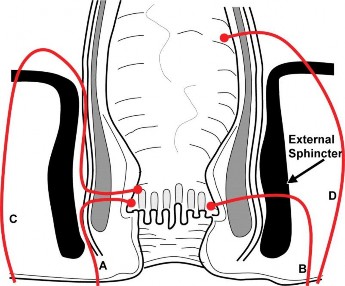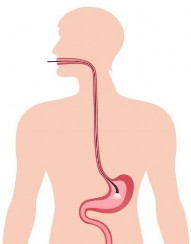What is an anal fistula?
An anal fistula is an abnormal connection between the lining on the inside of your anal canal (back passage) and the skin near your anus.
Most anal fistulas are caused by an abscess (a collection of pus) that has developed in your anal canal. The pus can drain away onto your skin on its own or by an operation. A fistula happens when the track made by the pus on the way to the surface of your skin stays open.
What does the operation involve?
The operation is usually performed under a general anaesthetic but various anaesthetic techniques are possible. The operation usually takes 30 to 45 minutes.
To lessen the risk of bowel incontinence (when you pass a bowel movement without wanting to) your treatment may involve several operations over a number of months.
The type of surgery you need will depend on where the fistula is.
- If the fistula is below or crosses the lower part of the sphincter muscles (the muscles around your anal canal that control when you open your bowels), your surgeon will cut the fistula open to your skin and leave your wound open so that it can heal with healthy tissue.
- If the fistula has branches that pass through the upper part of the sphincter muscles, your surgeon may instead place a special stitch (called a seton stitch) in the fistula to allow pus to drain easily as a first stage. And later may perform a second procedure to remove the fistulous tract. The fistula may be suitable for treatment with special glue, clips or a plug.
- If the fistula reaches above your sphincter muscles, you may need to have a temporary colostomy (your large bowel opening onto your skin). However, this is not common.
How can I prepare myself for the operation?
If you smoke, stopping smoking now may reduce your risk of developing complications and will improve your long-term health.
Try to maintain a healthy weight. You have a higher risk of developing complications if you are overweight.
You will be asked not to eat or drink some hours before admission to the hospital. If you usually take blood-thinning medication, you will be asked to stop taking it some days before the procedure.
You might also be asked to take an enema or laxative to empty out your bowel on the day of surgery.
What complications can happen? General complications of any operation
- bleeding
- infection of the surgical site (wound)
- allergic reaction to the equipment, materials or medication
- chest infection
Specific complications of this operation
- difficulty passing urine
- involuntarily passing wind or loose faeces
- bowel incontinence
Consequences of this procedure
- pain
- unsightly scarring of your skin
How soon will I recover?
You should be able to go home the same day or the day after.
Rest for a few days, walking as little as possible, to help your wound to heal.
You should be able to return to work as soon as you can move about and sit freely.
The wound often takes several weeks to heal completely and you may need to wear a pad until then.
Regular exercise should help you to return to normal activities as soon as possible. Before you start exercising, ask the healthcare team or your GP for advice.
Most people make a full recovery and can return to normal activities. For a small number of people, the fistula can come back.
What is an anal fistula?An anal fistula is an abnormal connection between the lining on the inside of your anal canal (back passage) and the skin near your anus.
Most anal fistulas are caused by an abscess (a collection of pus) that has developed in your anal canal. The pus can drain away onto your skin on its own or by an operation. A fistula happens when the track made by the pus on the way to the surface of your skin stays open.
What does the operation involve?
The operation is usually performed under a general anaesthetic but various anaesthetic techniques are possible. The operation usually takes 30 to 45 minutes.
To lessen the risk of bowel incontinence (when you pass a bowel movement without wanting to) your treatment may involve several operations over a number of months.
The type of surgery you need will depend on where the fistula is.
- If the fistula is below or crosses the lower part of the sphincter muscles (the muscles around your anal canal that control when you open your bowels), your surgeon will cut the fistula open to your skin and leave your wound open so that it can heal with healthy tissue.
- If the fistula has branches that pass through the upper part of the sphincter muscles, your surgeon may instead place a special stitch (called a seton stitch) in the fistula to allow pus to drain easily as a first stage. And later may perform a second procedure to remove the fistulous tract. The fistula may be suitable for treatment with special glue, clips or a plug.
- If the fistula reaches above your sphincter muscles, you may need to have a temporary colostomy (your large bowel opening onto your skin). However, this is not common.
How can I prepare myself for the operation?
If you smoke, stopping smoking now may reduce your risk of developing complications and will improve your long-term health.
Try to maintain a healthy weight. You have a higher risk of developing complications if you are overweight.
You will be asked not to eat or drink some hours before admission to the hospital. If you usually take blood-thinning medication, you will be asked to stop taking it some days before the procedure.
You might also be asked to take an enema or laxative to empty out your bowel on the day of surgery.
What complications can happen? General complications of any operation
- bleeding
- infection of the surgical site (wound)
- allergic reaction to the equipment, materials or medication
- chest infection
Specific complications of this operation
- difficulty passing urine
- involuntarily passing wind or loose faeces
- bowel incontinence
Consequences of this procedure
- pain
- unsightly scarring of your skin
How soon will I recover?
You should be able to go home the same day or the day after.
Rest for a few days, walking as little as possible, to help your wound to heal.
You should be able to return to work as soon as you can move about and sit freely.
The wound often takes several weeks to heal completely and you may need to wear a pad until then.
Regular exercise should help you to return to normal activities as soon as possible. Before you start exercising, ask the healthcare team or your GP for advice.
Most people make a full recovery and can return to normal activities. For a small number of people, the fistula can come back.



